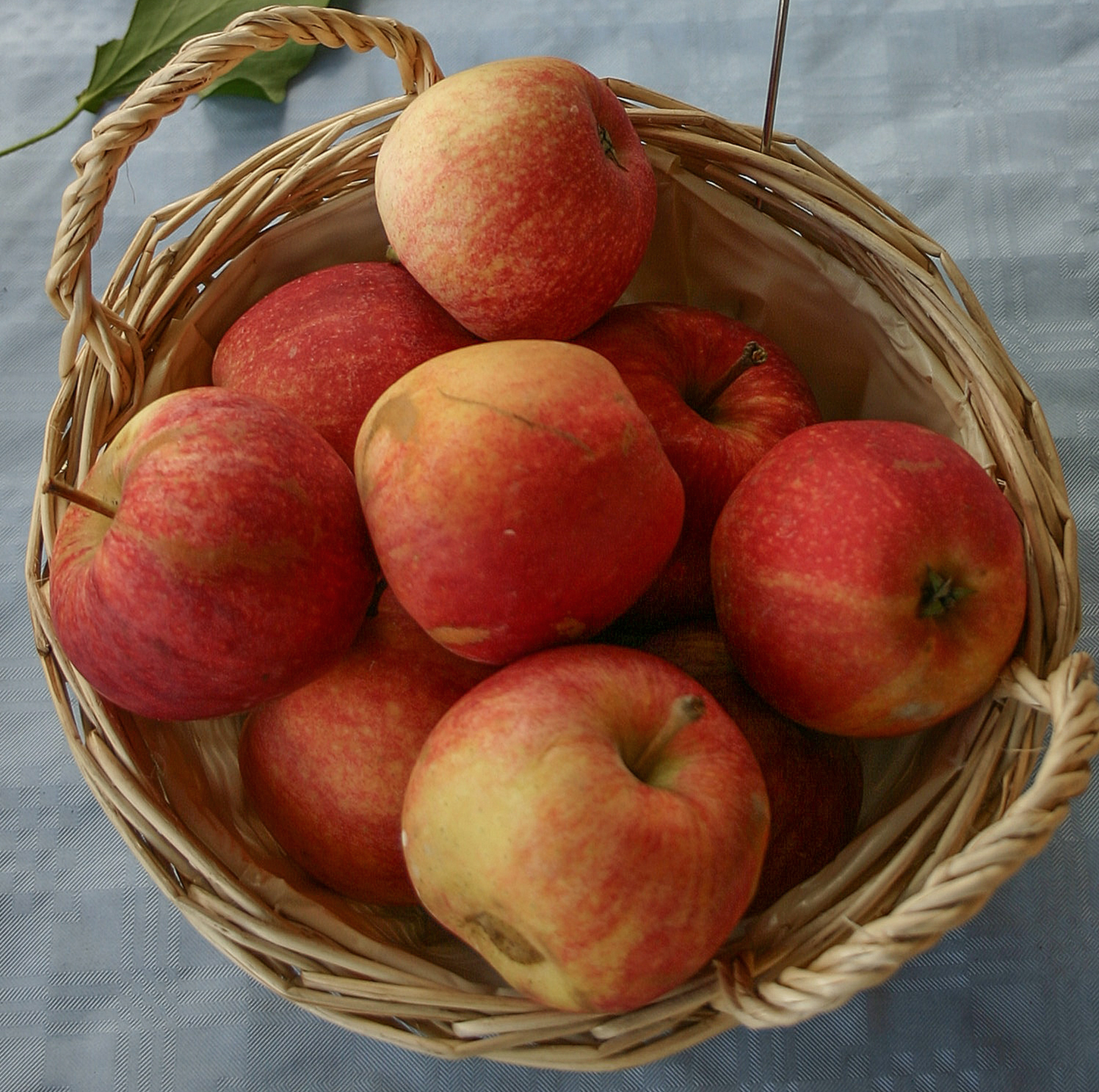 Breeding apples is hard work. It takes 5 years to produce fruit from seed and you can't even cross them with close relatives.* Despite the difficulty of developing new varieties, there's already an incredible diversity of growth habits and fruit types in wild and domesticated apples, but almost all our commercial varieties are simply grafted clones that some lucky farmer found growing on his land. Today, only 11 such clones account for more than 90% of apples sold in the U.S.
Breeding apples is hard work. It takes 5 years to produce fruit from seed and you can't even cross them with close relatives.* Despite the difficulty of developing new varieties, there's already an incredible diversity of growth habits and fruit types in wild and domesticated apples, but almost all our commercial varieties are simply grafted clones that some lucky farmer found growing on his land. Today, only 11 such clones account for more than 90% of apples sold in the U.S.Even easy improvements to apple varieties (e.g. introgressing a new resistance gene from a wild relative) generally takes two decades. It's all but impossible to make more complex changes (e.g. fruit quality) within one person's career. But there may be a shortcut...
A poplar tree gene has been discovered that causes fruit tree seedlings to grow green and slouchy - but produce fruit in less than a year. Scientists, including some at the Appalachian Fruit Research Station, have hatched a plan - they're going to genetically engineer this gene into apple varieties. This will allow them to cross different wild and domesticated apple varieties and select improved offspring (with marker-assisted breeding) almost as fast as you can in corn! During early cycles they'll select for offspring with the fast-flowering transgene in addition to fruit quality traits. Once they have the fruit traits they want, they'll simply select an offspring that doesn't contain the transgene and presto! A healthy apple tree with novel fruit quality traits in a few years instead of decades!
h/t: Besting Johnny Appleseed
*Apples have some degree of self-incompatibility that prevents establishment of pollen grains that share too much genetic similarity with the mother plant. Kinda like our antibody-mediated immune system, plants produce proteins that recognize whether pollen is closely or distantly related (if the matching proteins are the same or different). I'm not sure if apples are obligate outcrossers (e.g. can never self-pollinate), but it's apparently enough to slow breeding.

I am torn. On one hand this is a very awesome idea. Apples are a very important crop and better breeding tools will definitely have a huge positive impact for farmers and consumers.
ReplyDelete...On the other hand to me there has always been a certain kind of throw back nostalgia thinking about breeders doing multi(human) generational work. It makes something like introgressing a single gene seem epic. Of course that is no reason not to pursue this technology.
cool post.
Whoa! So cool.
ReplyDeleteBeautiful! (And I cynically wait to hear the anti-GE croud sulk about it.)
ReplyDeleteVery cool approach, and it will be interesting to see how people respond to a new variety produced in this way, or even whether it will be mentioned. I expect not.
ReplyDeleteI'm going to be a real bore and ask for the source of the 11 varieties account for 90% statistic, please.
Thanks.
This comment has been removed by the author.
ReplyDeleteThe story's from the journal Science, which for those of you who don't know, is arguably the most reputable source of science in the world.
ReplyDeleteAt any rate, it was a journalistic piece and didn't have citations. I googled around for USDA apple statistics and found the U.S. Apple Association, a trade group I guess, cited in some of the figures. Their website contains free statistics for the year 2005, which shows 86% of apples are produced from the top 11 varieties.
http://www.usapple.org/industry/applestats/outlook2005/index.cfm
Last time I heard, the American regulatory agencies don't consider a plant that had a transgenic parent (but does not contain any transgenic sequence themselves) as transgenic. European agencies I think would still consider it as "transgenic."
ReplyDeleteMat: I didn't realize that the stat too was quoted from Science. Thanks for doing the further digging.
ReplyDeleteI don't think European agencies would consider a plant without transgenetic sequences a GMO. I also think there would be more consumer acceptance when compared with ordinary GMOs.
ReplyDeleteIn Europe there's not a lot of regulation of foods made only with the assistance of GMOs, but don't themselves contain GMOs, like hard cheese rennet or aspartame.
I wonder though if there's really any benefit to using GE + MAS, vs strictly MAS. I would think the use of the poplar tree gene may not prove very important in the end.
Patrick,
ReplyDeleteThat's interesting about the European agencies. I had heard at work that European agencies were no longer allowing non-transgenic siblings of transgenic plants to be used as controls in biosafety experiments - which was what I based my supposition on.
The advantage of the poplar gene is being able to breed in 1 year cycles versus 5. I agree that MAS could account for most of the gain for well-characterized traits, but if you're going for something that's more poorly-defined (like fruit quality) you'll need to wait for fruit before you make selection decisions. Though the article does make the claim that they're very close to defining some fruit quality traits with markers.
I'm sorry I missed it. What is wrong with apples as they are?
ReplyDeleteThere are lots of excellent apple varieties, but like any fruit or vegetable there's always room for new and interesting flavors, better storage quality and (in this case) resistance to diseases that reduces pesticide sprays and raises yield.
ReplyDelete